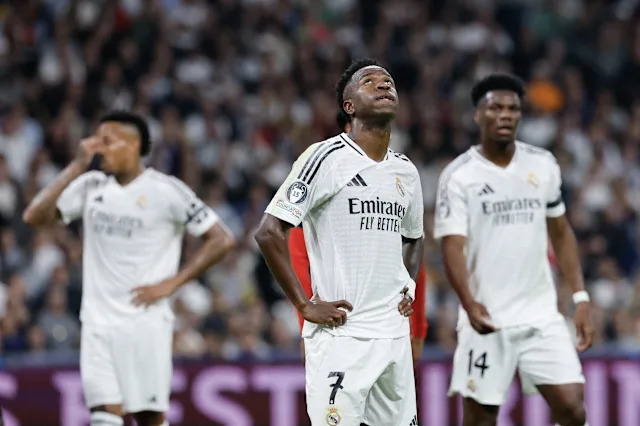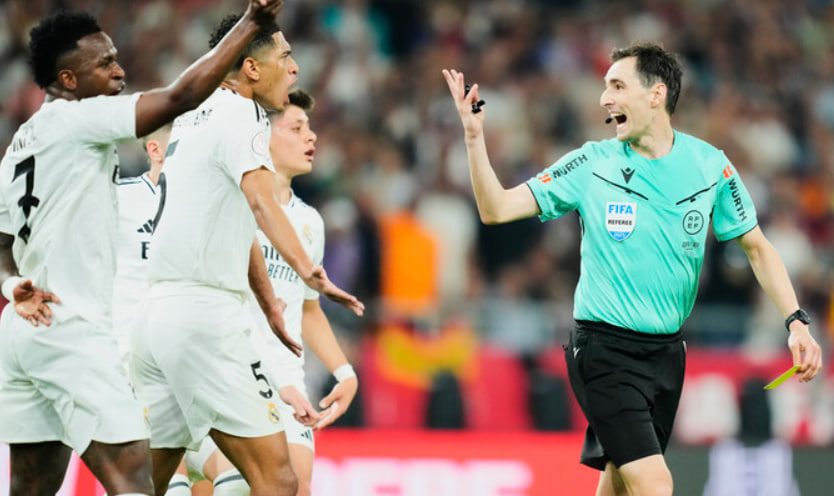This season, Real Madrid (referred to as “Real Madrid” for short) has not performed as expected. As last season’s double winners of La Liga and the Champions League, they should have continued their strong form, but the reality is that they have been inconsistent in multiple competitions. Many are asking: Why has Real Madrid suddenly fallen off the pace? In addition to factors such as injuries and a busy schedule, an often overlooked key reason is player discipline issues.
Real Madrid players often lose control
In recent games, Real Madrid players have repeatedly received red and yellow cards for losing control of their emotions. This behavior not only affects the team’s overall performance, but also leaves them without key players at crucial moments. Despite being an experienced coach, Carlo Ancelotti seems helpless in the face of these unexpected situations.

For example, in the final of the Copa del Rey between Real Madrid and Barcelona, defender Antonio Ruediger was suspended for six games after the match for making an inappropriate gesture to the referee, while another player, Lucas Vazquez, was suspended for two games for entering the pitch to argue with the referee. The combined absence of these two players will leave Real Madrid, already shorthanded, without eight key players, which is undoubtedly a major blow.
More surprisingly, midfielder Jude Bellingham was shown a red card in the same game, but the decision was later overturned by the disciplinary committee. Despite this, Real Madrid’s disciplinary record for the season remains extremely poor.
Record number of suspensions
According to statistics, since the start of the season, eight Real Madrid players have been suspended for a total of 21 games for various offences. Among them:
These figures show that Real Madrid players often have trouble controlling their emotions during matches. Sometimes this is due to provocation from opponents, and sometimes it is due to unfair refereeing decisions. Whatever the cause, the end result is always felt in the team’s performance.
Are the referees really out to get Real Madrid?
Faced with this situation, some Real Madrid fans and media outlets believe that the referees are unfair to Real Madrid, even going so far as to say that they are “targeted”. Real Madrid TV also often emphasizes this point. However, the reality is not so simple.
Take the final of the Copa del Rey as an example. After the game, Real Madrid captain Dani Carvajal publicly insulted the referee as a “bastard,” but so far he has not received any additional punishment.
If a player from another club had done the same thing, he would probably have been suspended. Therefore, it can be said that in some cases Real Madrid has actually been treated “favorably”.
In other words, Real Madrid’s problems are more internal than external. The players must learn to control their emotions, respect the referees and follow the rules. Otherwise, even the strongest team cannot remain competitive in the long run.
How does disciplinary action affect performance?
If a team frequently has players suspended, the immediate effect is an incomplete lineup. Especially in crucial games, the absence of key players often leads to defeat. For example, Rudiger is the heart of the defense, and his absence for six games weakens the defense; Vinicius is a powerful offensive weapon, and without him, the frontcourt loses a spark.
In addition, frequent player suspensions cause tactical headaches for the coaching staff, forcing coaches to rotate players or adjust their lineups in advance to deal with potential suspensions, which also affects the team’s overall rhythm and coordination.
Summary: Attitude is everything
Real Madrid’s current predicament is not due to a significant decline in strength, but rather problems with the attitude and discipline of their players. They have become accustomed to winning, sometimes showing contempt for referees, opponents, and even the rules of the game. Once this “sense of superiority” takes hold, it leads to uncontrolled behavior and ultimately comes at a price.
For Real Madrid, the next steps are not only to adjust tactics and regain form, but more importantly, to strengthen the professionalism of the players, increase their focus during matches, and improve their emotional management skills. Only then can they truly emerge from this low point and return to the pinnacle of success.
